Incongruity in a modest proposal – Incongruity in “A Modest Proposal” sets the stage for this enthralling narrative, offering readers a glimpse into a story that is rich in detail and brimming with originality from the outset. The use of incongruity in this satirical work highlights the absurdity of the narrator’s proposal, creating a powerful and thought-provoking commentary on the social and economic issues of the time.
Throughout the essay, Swift employs incongruity to challenge the reader’s assumptions and perspectives, ultimately exposing the flaws in the society he critiques. By juxtaposing seemingly incompatible elements, Swift creates a sense of irony that underscores the absurdity of his proposal and invites the reader to question their own beliefs and values.
Incongruity in “A Modest Proposal”
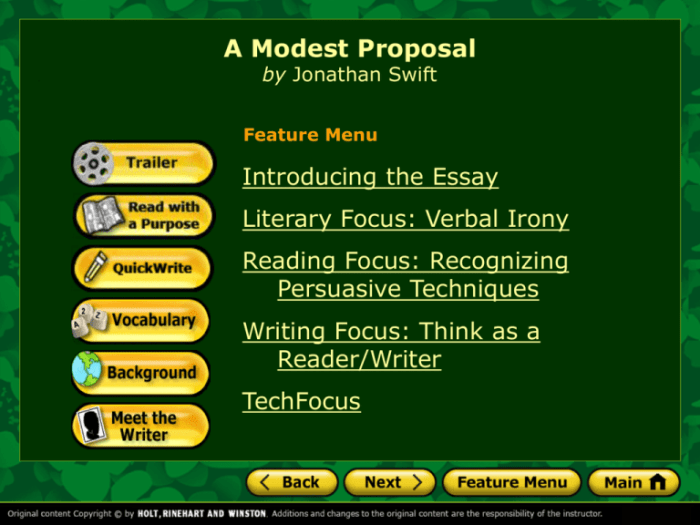
Incongruity, a literary device that juxtaposes contrasting elements, is a cornerstone of satire, a genre that employs humor, irony, and exaggeration to criticize society. Jonathan Swift’s “A Modest Proposal” exemplifies the use of incongruity to satirize the apathy and hypocrisy of the Irish ruling class towards the plight of the poor.
Swift’s proposal, to alleviate poverty by selling children as food, is a prime example of incongruity. The juxtaposition of a seemingly rational solution to a serious problem with the horrific nature of the proposed solution creates a jarring effect that highlights the absurdity of the situation.
Swift’s Use of Incongruity
- Hyperbolic Language:Swift employs exaggeration to amplify the absurdity of his proposal, such as suggesting that children be “roasted, boiled, and stewed” and that “a young healthy child well nursed is, at a year old, a most delicious nourishing and wholesome food.”
- Callous Indifference:The narrator’s detached and matter-of-fact tone towards the suffering of children creates a stark contrast with the horrific nature of his proposal.
- Economic Calculations:Swift provides detailed economic calculations to support his proposal, further emphasizing the incongruity between the seriousness of the problem and the absurdity of the solution.
Swift’s Purpose in Using Incongruity: Incongruity In A Modest Proposal
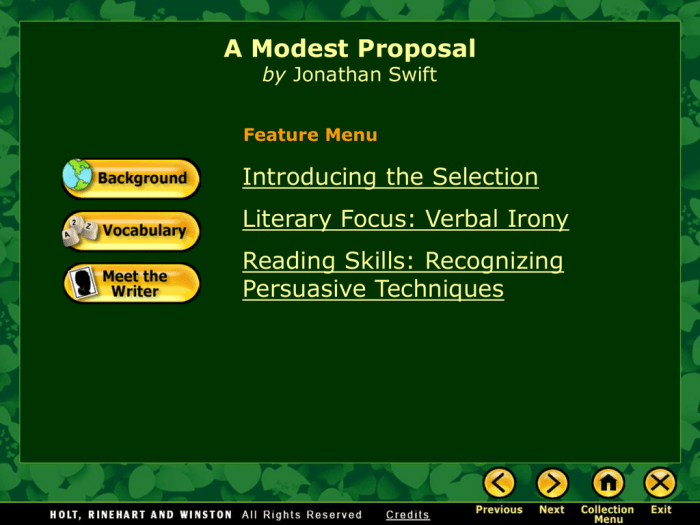
Jonathan Swift’s “A Modest Proposal” is a satirical essay that uses incongruity to convey its message. Incongruity is the juxtaposition of two or more elements that are seemingly incompatible or contradictory. Swift uses incongruity to create a sense of discomfort and absurdity, which forces the reader to confront the harsh realities of the Irish famine.
Satirical Intent, Incongruity in a modest proposal
Swift’s primary purpose in using incongruity is to satirize the indifference and apathy of the English ruling class towards the plight of the Irish people. By presenting a seemingly absurd proposal to eat Irish children as a solution to poverty, Swift highlights the absurdity of the English government’s policies and their willingness to sacrifice the lives of the Irish for their own economic gain.
Effectiveness of Argument
Incongruity contributes to the effectiveness of Swift’s argument by making it more memorable and thought-provoking. The reader is forced to confront the absurdity of Swift’s proposal and, in doing so, they are forced to confront the harsh realities of the Irish famine.
The incongruity creates a sense of cognitive dissonance that forces the reader to reconsider their own beliefs and values.
The Role of Incongruity in Creating Irony
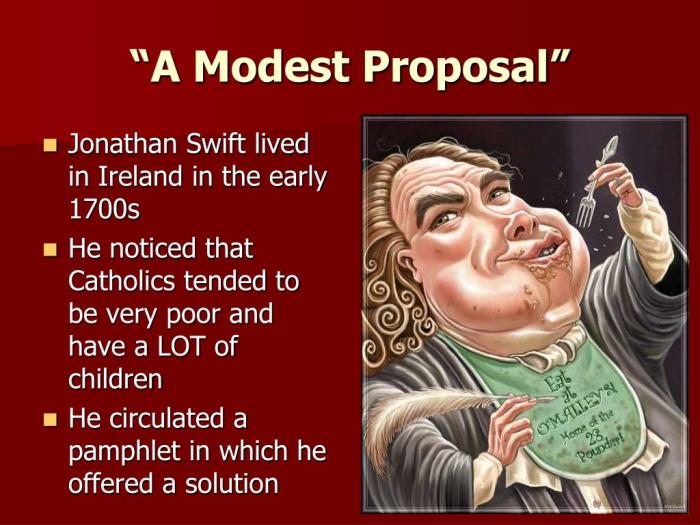
Irony arises when there is a significant difference between what is expected and what actually occurs. Incongruity plays a crucial role in creating irony by juxtaposing contrasting elements that evoke surprise or amusement.
Examples of Irony in “A Modest Proposal”
In “A Modest Proposal,” Swift employs incongruity to create irony through several instances:
- The proposal’s absurdity:Swift’s suggestion that the Irish poor sell their children as food is inherently ironic. The juxtaposition of such a gruesome act with a serious tone creates a stark contrast that highlights the absurdity of the proposal.
- The narrator’s detachment:The narrator’s冷静dispassionate presentation of the proposal adds to the irony. His detached tone contradicts the horrifying nature of the proposal, further emphasizing its absurdity.
- The economic benefits:Swift ironically presents the proposal as a solution to Ireland’s economic problems. The incongruity between the grotesque nature of the proposal and its purported economic benefits creates a satirical commentary on the superficiality of economic reasoning.
Incongruity and the Reader’s Response
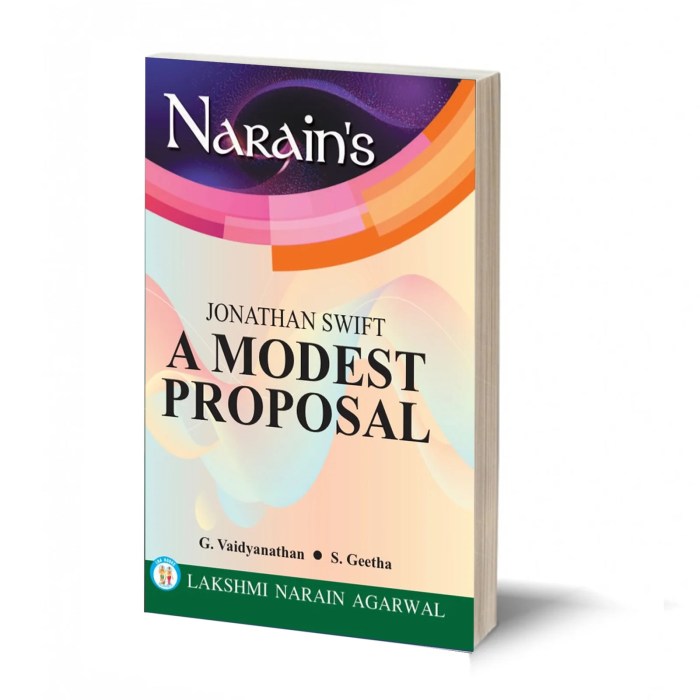
Incongruity plays a significant role in shaping the reader’s emotional and intellectual response to “A Modest Proposal.” It creates a sense of discomfort and challenges the reader’s assumptions and perspectives, leading to a deeper understanding of the text’s satirical intent.
Emotionally, incongruity evokes a range of reactions, including shock, disgust, and amusement. The juxtaposition of seemingly unrelated or contradictory elements creates a sense of unease that forces the reader to confront the absurdity of the proposal. This emotional response is essential for understanding the satire, as it highlights the inherent ridiculousness of the solution presented.
Intellectual Response
Intellectually, incongruity challenges the reader’s assumptions and perspectives. By presenting a proposal that is both outrageous and seemingly logical, Swift forces the reader to question their own beliefs and values. The reader is forced to confront the underlying assumptions that support the proposal, and in doing so, they gain a deeper understanding of the social and political issues that Swift is satirizing.
Incongruity as a Literary Device
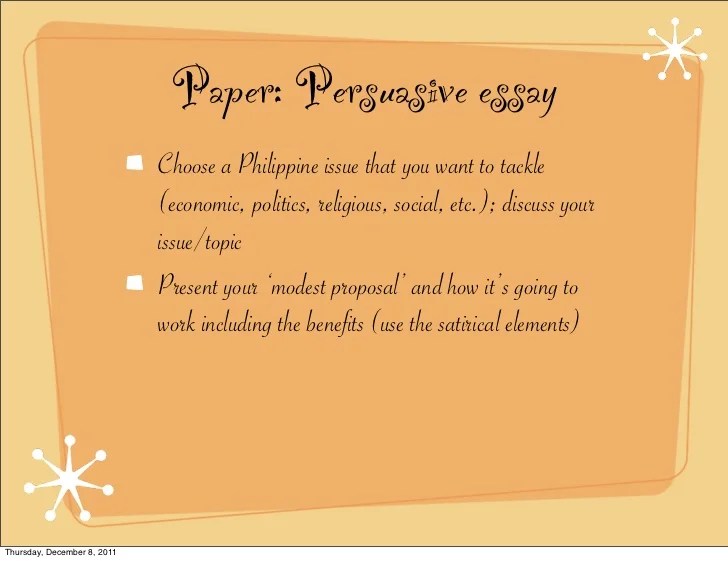
Incongruity is a powerful literary device that creates surprise, humor, and insight. It involves the juxtaposition of elements that are seemingly incompatible or contradictory, producing a sense of disharmony and disruption. By disrupting expectations and challenging established norms, incongruity can highlight the absurdity, hypocrisy, or complexity of human nature and society.
Examples of incongruity in other literary works abound. In Shakespeare’s Hamlet, the protagonist’s soliloquies are filled with incongruous imagery, such as the famous “To be or not to be” speech, which juxtaposes profound philosophical questions with mundane concerns about life and death.
Incongruity in Absurdist Literature
Incongruity plays a central role in absurdist literature, which seeks to expose the meaninglessness and irrationality of the human condition. In Samuel Beckett’s play Waiting for Godot, two characters engage in endless, repetitive dialogue while waiting for a mysterious figure who never arrives.
The play’s absurd premise and lack of resolution create a sense of profound incongruity, highlighting the futility and absurdity of human existence.
FAQ
What is incongruity?
Incongruity refers to the juxtaposition of contrasting or incompatible elements, creating a sense of surprise or absurdity.
How does Swift use incongruity in “A Modest Proposal”?
Swift employs incongruity to highlight the absurdity of the narrator’s proposal, satirizing the social and economic issues of his time.
What is the purpose of incongruity in “A Modest Proposal”?
Incongruity serves to challenge the reader’s assumptions, expose the flaws in society, and enhance the effectiveness of Swift’s satirical argument.